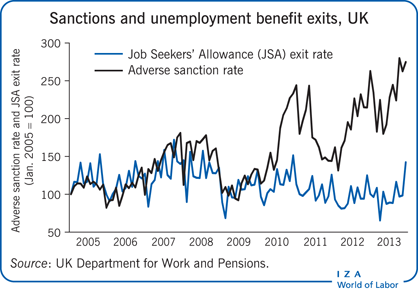Elevator pitch
Unemployment benefits often reduce incentives to search for a job. Policymakers have responded to this behaviour by setting minimum job search requirements, by monitoring to check that unemployment benefit recipients are engaged in the appropriate level of job search activity, and by imposing sanctions for infractions. Empirical studies consistently show that job search monitoring and benefit sanctions reduce unemployment duration and increase job entry in the short term. There is some evidence that longer-term effects of benefit sanctions may be negative.

Key findings
Pros
Most developed countries have some form of job search monitoring for unemployment benefit recipients and a system of benefit sanctions for infractions.
Even just the threat of benefit sanctions can reduce unemployment duration and increases job entry rates.
Being sanctioned reduces unemployment duration following the sanction and increases the rate of job entry.
Job search monitoring leads to shorter unemployment duration and higher job entry rates in the short term.
There is enough evidence to question recent moves in some countries to relax such measures.
Cons
There is some evidence that being sanctioned can lead to withdrawal from the labor force and a reduction in post-unemployment earnings.
More research is needed to examine the effects of monitoring and sanctions in a wider range of contexts, on a wider range of outcomes, and over a longer time frame.